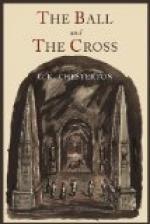“Evan,” said the voice, and it spoke with the simple authority of some forgotten father revisiting his children, “you have remained here long enough, and your sword is wanted elsewhere.”
“Wanted for what?” asked the young man, accepting the monstrous event with a queer and clumsy naturalness; “what is my sword wanted for?”
“For all that you hold dear,” said the man standing in the moonlight; “for the thrones of authority and for all ancient loyalty to law.”
Evan looked up at the lunar orb again as if in irrational appeal—a moon calf bleating to his mother the moon. But the face of Luna seemed as witless as his own; there is no help in nature against the supernatural; and he looked again at the tall marble figure that might have been made out of solid moonlight.
Then he said in a loud voice: “Who are you?” and the next moment was seized by a sort of choking terror lest his question should be answered. But the unknown preserved an impenetrable silence for a long space and then only answered: “I must not say who I am until the end of the world; but I may say what I am. I am the law.”
And he lifted his head so that the moon smote full upon his beautiful and ancient face.
The face was the face of a Greek god grown old, but not grown either weak or ugly; there was nothing to break its regularity except a rather long chin with a cleft in it, and this rather added distinction than lessened beauty. His strong, well-opened eyes were very brilliant but quite colourless like steel.
MacIan was one of those to whom a reverence and self-submission in ritual come quite easy, and are ordinary things. It was not artificial in him to bend slightly to this solemn apparition or to lower his voice when he said: “Do you bring me some message?”
“I do bring you a message,” answered the man of moon and marble. “The king has returned.”
Evan did not ask for or require any explanation. “I suppose you can take me to the war,” he said, and the silent silver figure only bowed its head again. MacIan clambered into the silver boat, and it rose upward to the stars.
To say that it rose to the stars is no mere metaphor, for the sky had cleared to that occasional and astonishing transparency in which one can see plainly both stars and moon.
As the white-robed figure went upward in his white chariot, he said quite quietly to Evan: “There is an answer to all the folly talked about equality. Some stars are big and some small; some stand still and some circle around them as they stand. They can be orderly, but they cannot be equal.”
“They are all very beautiful,” said Evan, as if in doubt.
“They are all beautiful,” answered the other, “because each is in his place and owns his superior. And now England will be beautiful after the same fashion. The earth will be as beautiful as the heavens, because our kings have come back to us.”




